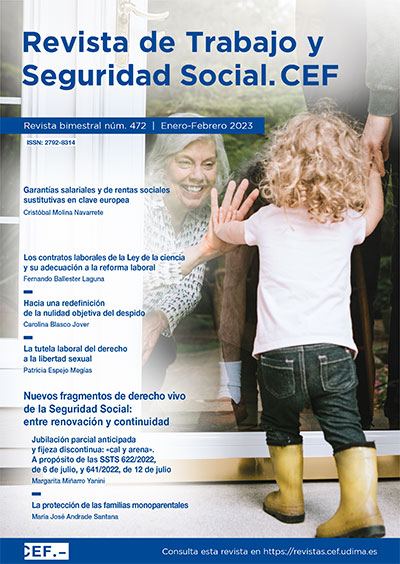Labor protection of the right to sexual freedom: comprehensive protection?
DOI:
https://doi.org/10.51302/rtss.2023.7219Keywords:
labor protection, comprehensive protection, fundamental rights, general duty of prevention, occupational risks, necessary training, violence-free companiesAbstract
The aim of this scientific paper is to analyze the labor aspects of Organic Law 10/2022, 6th September, on the comprehensive guarantee of the sexual freedom of all persons, in particular women, girls and boys, as the main victims of all forms of sexual violence. Comprehensively guaranteeing the right to sexual freedom necessarily involves undertaking a series of legal reforms that must undoubtedly go beyond the walls of labor relations. The workplace is a complex scenario where violations of the right to sexual freedom and the moral integrity of workers often take place, which is why it is necessary to modify the body of labor legislation in order to make effective in this area the protection and the right to comprehensive social assistance for all workers who are considered victims of sexual violence; a violence forgotten by the previous Organic Law on comprehensive protection measures against gender violence approved in 2004. Thus, in the following pages, we will analyze the amendments made by virtue of this organic law to the revised text of the Workers’ Statute Law, to the revised text of the Basic Statute of the Public Employee Law and to the General Social Security Law. Similarly, but in the opposite direction, the consequences of the failure to amend the Law on the prevention of occupational risks will be analyzed.
Downloads
References
Álvarez Cuesta, H. (21 de septiembre de 2022). Aspectos laborales de la Ley orgánica 10/2022, de 6 de septiembre, de garantía integral de la libertad sexual. AEDTSS. https://www.aedtss.com/aspectos-laborales-de-la-ley-organica-10-2022-de-6-de-septiembre-de-garantia-integral-de-la-libertad-sexual/
Baylos Grau, A. (24 de febrero de 2020). ¿Debe ser declarado improcedente el despido por enfermedad tras la derogación del art. 52 d) del Estatuto de los Trabajadores? Según Antonio Baylos… https://baylos.blogspot.com/2020/02/debe-ser-declarado-improcedente-el.html
Cuenca Piqueras, C. (2015). Factores precipitantes del acoso sexual laboral en España. Revista Mexicana de Sociología, 77(4), 525-554. http://revistamexicanadesociologia.unam.mx/index.php/rms/article/view/52665/46857
Delegación del Gobierno contra la Violencia de Género. (2022). Estadísticas, encuestas, estudios e investigaciones. https://violenciagenero.igualdad.gob.es/violenciaEnCifras/victimasMortales/home.htm
Espejo Megías, P. (16 de enero de 2019). Violencia de género y formación judicial. Habla Patricia Espejo. Según Antonio Baylos… https://baylos.blogspot.com/2019/01/violencia-de-genero-y-formacion.html
Gómez Gil, C. (2018). Objetivos de Desarrollo Sostenible (ODS): una revisión crítica. Papeles de Relaciones Ecosociales y Cambio Global, 140, 107-118.
Olarte Encabo, S. (2020). Prevención del riesgo laboral de acoso sexual y acoso sexista. En M. Correa Carrasco y M. G. Quintero Lima (Coords.), Los nuevos retos del trabajo decente: la salud mental y los riesgos psicosociales (pp. 63-94). UC3M. https://e-archivo.uc3m.es/bitstream/handle/10016/29725/nuevos_retos_trabajo_2020.pdf
ONU. (2021). A/HRC/47/26: La violación como una vulneración grave, sistemática y generalizada de los derechos humanos, un delito y una manifestación de la violencia de género contra las mujeres y las niñas, y su prevención. Informe de la relatora especial sobre la violencia contra la mujer, sus causas y consecuencias, Dubravka Šimonovic. https://www.ohchr.org/es/documents/reports/ahrc4726-rape-grave-systematic-and-widespread-human-rights-violation-crime-and
Downloads
Published
Versions
- 2023-01-04 (2)
- 2022-12-19 (1)



















